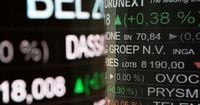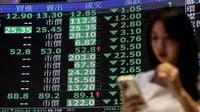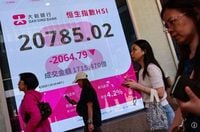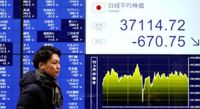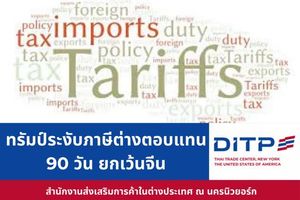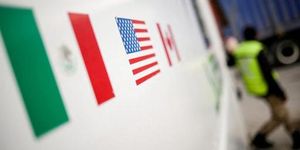On Monday, April 7, 2025, Asian stock markets opened the week with a significant downturn, triggered by the announcement of new trade tariffs by U.S. President Donald Trump. The fallout from this announcement has sent shockwaves through financial markets across the continent, leading to widespread panic and massive sell-offs.
The Hang Seng index in Hong Kong opened with a staggering drop of 9.28%, losing over 2,100 points and dragging down major companies heavily exposed to international trade. Notable declines included HSBC, which fell by 15.85%, Alibaba at 9.72%, and Tencent at 7.43%. In Singapore, the Straits Times index lost 8.58% at the start, while in China, the Shanghai index opened down 4.46% and Shenzhen by 6.04%.
The Nikkei 225 index in Japan was not spared, plummeting up to 7.6% within the first hour of trading, hitting its lowest point since October 2023. The banking sector was particularly hard-hit, with the sector index recording an intraday loss of 17.3%. Major banks like Resona Holdings, Mizuho Financial Group, and Nomura Holdings saw declines of 12.2%, 11.3%, and 10.9%, respectively.
As the markets reacted to the escalating trade tensions, President Trump defended his tariff strategy, claiming it was necessary to correct decades of trade imbalances. Speaking aboard Air Force One, he stated, "Sometimes it is necessary to take medicine to heal," referring to the market crashes. He emphasized that the tariffs would remain in place until a satisfactory resolution to trade deficits with China and the European Union was reached.
Trump's tariffs, announced on April 2, 2022, included a broad 10% tax on all imports, alongside targeted levies that could reach as high as 49% on certain nations. Currently, China faces combined tariffs of 54%, with 20% already imposed. In retaliation, Beijing has implemented a 34% tariff on a wide range of U.S. imports, including agricultural products, energy raw materials, and key technology components, further escalating the trade conflict.
Market analysts warn that the current situation could lead to a deeper global economic slowdown, particularly affecting countries like Japan, China, and South Korea, which rely heavily on exports to the U.S. The uncertainty surrounding the trade war has already begun to impact the stock prices of major tech companies, with Apple, Samsung, and Sony facing potential production disruptions due to the tariffs.
As the panic spread, futures for U.S. stock indices also fell sharply during Asian trading on Monday, raising fears of another "Black Monday" reminiscent of the 1987 market crash. The S&P 500 futures were down 2.5%, while the Dow Jones futures dropped 2.1%, and the Nasdaq futures fell by 3.1%.
The ramifications of this trade war are not limited to Asia. European markets are bracing for a heavy opening, with the Stoxx 50 index already trading down by 4% in pre-market activity. European leaders are expressing concerns that the escalating trade tensions could jeopardize the post-pandemic economic recovery. Markus J. Beyrer, general manager of BusinessEurope, noted, "The trade tensions risk compromising the recovery, and urgent measures are needed to defend Europe's competitiveness."
Japan's Prime Minister Shigeru Ishiba is expected to travel to the United States soon to discuss the tariffs with American officials, emphasizing the need to clarify that Japan is not acting unfairly in the global trade landscape. He described the imposition of tariffs as "extremely unpleasant," particularly for the automotive sector, which is crucial to Japan's economy.
In response to the ongoing crisis, the Chinese government has labeled the U.S. tariffs as an economic aggression and is preparing proportionate counter-measures. Officials in Beijing have indicated that they may impose restrictions on the export of rare earth minerals and other strategic components essential for electronics production.
As the situation develops, the global economy faces a precarious future. The chief economist at JP Morgan Asia, Rajiv Biswas, remarked, "We have entered a phase of total trade war. If China responds harshly, the global supply chain will be devastated, and the effects will be felt in consumer prices in the West."
The markets are currently in a state of turmoil, with investors bracing for further volatility in the coming days and weeks. The fear of a global recession looms large, as Goldman Sachs has raised the probability of the U.S. entering a recession within the next 12 months from 35% to 45%.
In summary, the opening of the Asian markets on April 7, 2025, reflects the severe impact of the ongoing trade war initiated by President Trump's tariffs. With major indices in Hong Kong, Japan, and Taiwan experiencing significant losses, the global financial landscape is on edge, awaiting the next developments in this escalating conflict. The stakes are high, and the world watches closely as the U.S. and China navigate this tumultuous economic landscape.
